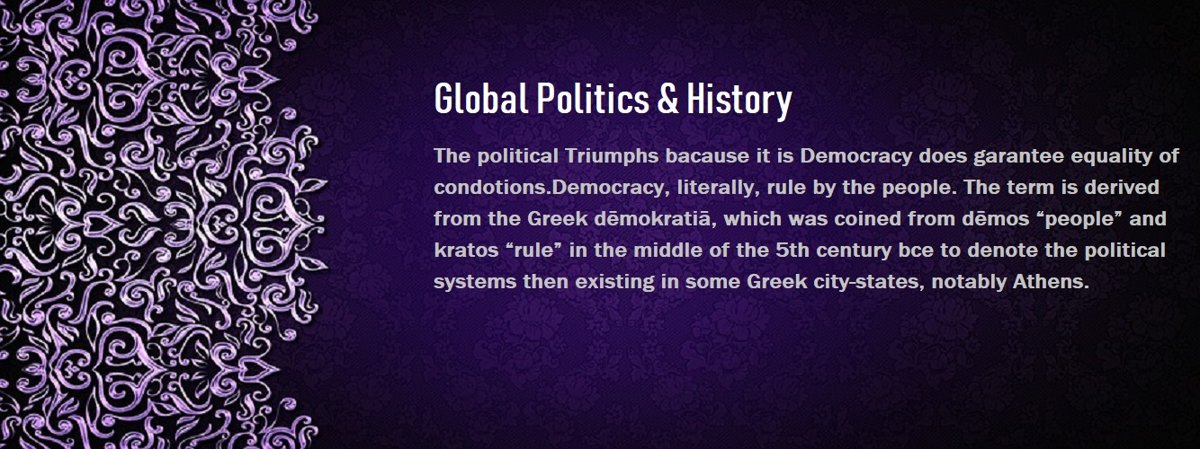TURKEY' FAILED MILITARY COUP 2016,TURKEY HAS SO FAR DETAINED OVER 7,500 AND SACKED ALMOST 9000 OFFICIALS IN IT'S RELENTLESS PURGE OF SUSPECTED PLOTTERS AND SENTENCED 40 PEOPLE TO LIFE IN PRISON OVER PLOT TO KILL ERDOGAN .TURKEY'S DEMOCRACY WAS ALWAYS PROBLEMATIC ONE ,IN COUNTRY ONCE DOMINATED BY GENERAL.
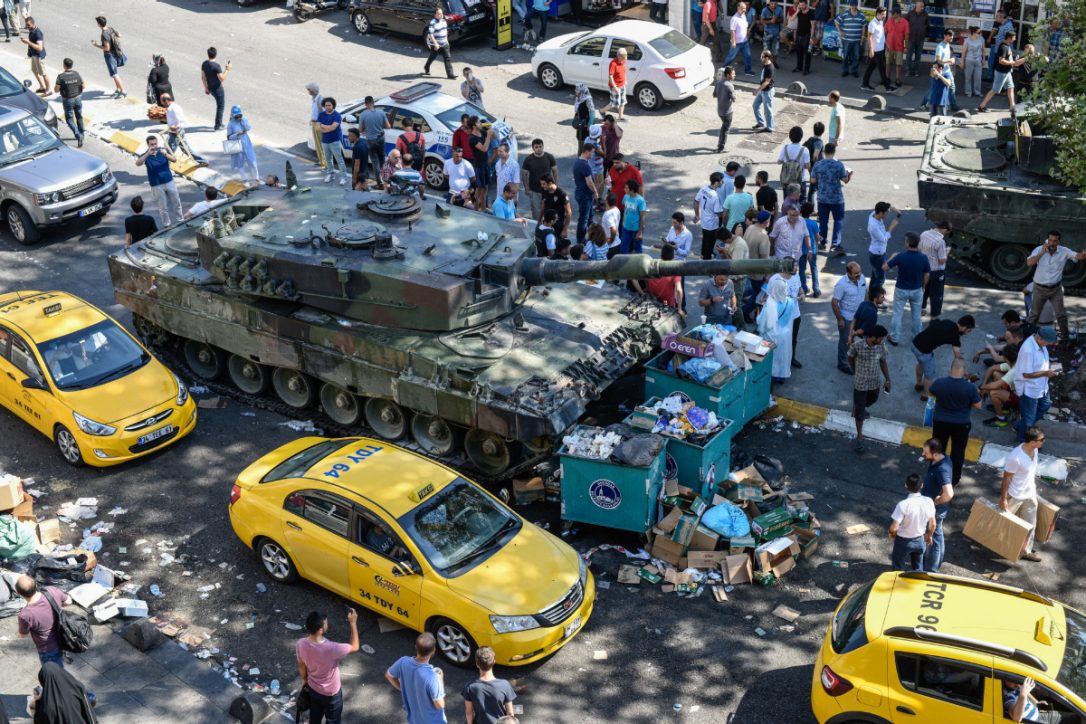
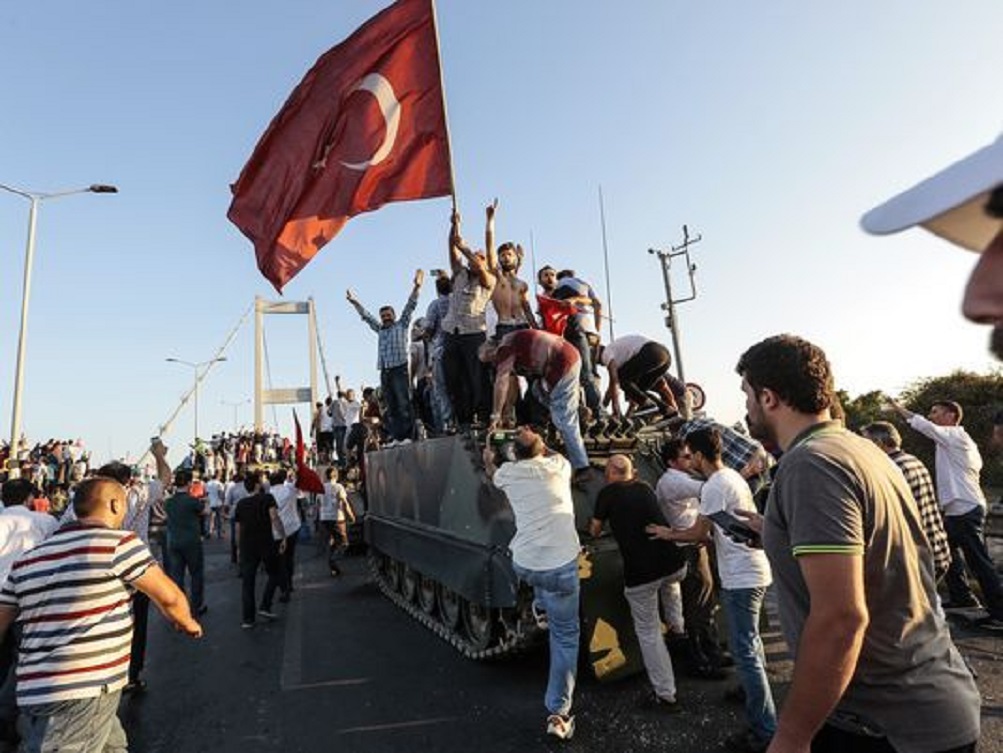
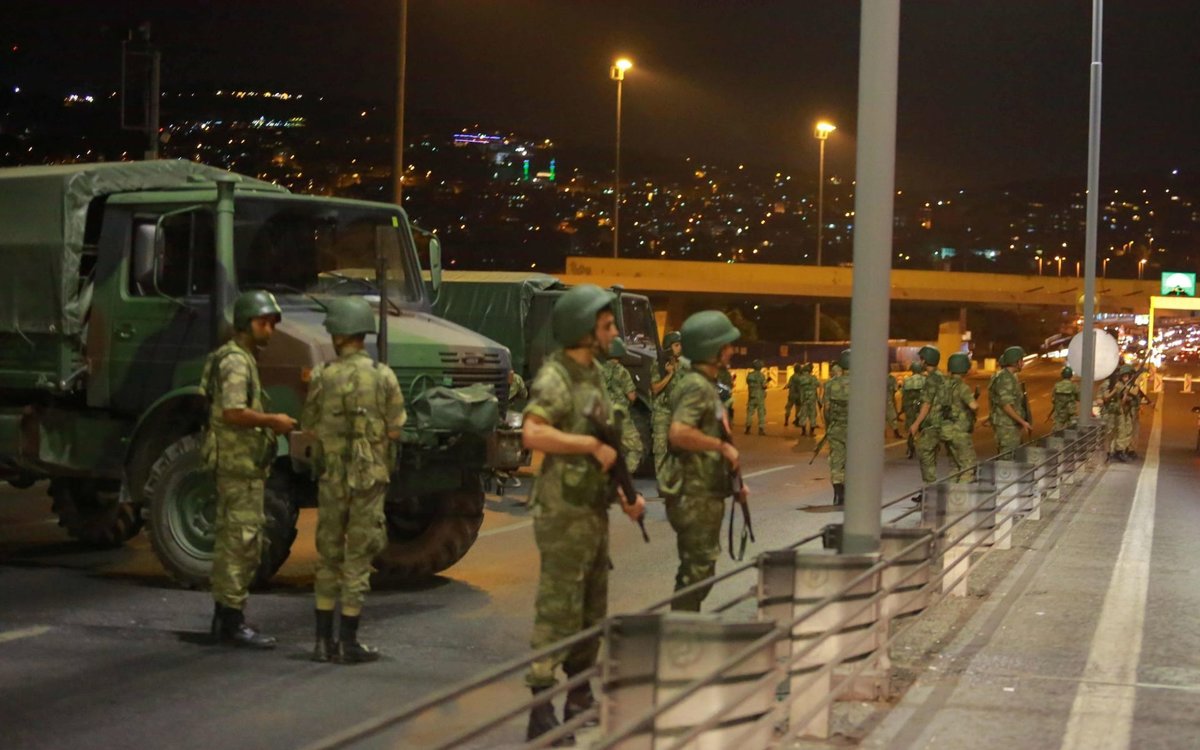 Failure
to arrest Erdogan is a very important indication of the real intentions
to overthrow the government. The Erdogan was on vacation in a resort
on the Mediterranean, as soon as he learned about the coup, he
immediately took off in his private jet.
While he continued to fly unobstructed in the Turkish skies, many
mosques in Ankara and Istanbul began to convey similar messages calling
on the population to take to the streets.
Failure
to arrest Erdogan is a very important indication of the real intentions
to overthrow the government. The Erdogan was on vacation in a resort
on the Mediterranean, as soon as he learned about the coup, he
immediately took off in his private jet.
While he continued to fly unobstructed in the Turkish skies, many
mosques in Ankara and Istanbul began to convey similar messages calling
on the population to take to the streets.
The drama that began unfolding in Turkey late Friday evening in 2016 with the beginning of a failed coup attempt by rebel Turkish soldiers was graphically captured on videos that have gone viral on the internet.The onset of the coup caught Turkish President Recep Tayyip Erodogan on vacation in the Turkish resort of Maramris. "They bombed places I had departed right after I was gone," he said. "They probably thought we were still there," said the president, whose Islamic principles are at odds with the secular political ideology on which modern Turkey was founded.The failure to appoint a credible representative may be attributable to poor planning and experience, or something deeper, perhaps linked to a sabotage of the coup. Forces and political representatives probably withdrew at the last moment. We can continue speculating on this aspect, but for the meantime this decision remains simply a big mistake made by the military junta.The third, fifth and sixth points are most likely related to a strong unwillingness of men and inexperience (only 3 generals and 29 colonels). The bulk of the troops, made up of simple soldiers and tanks were deployed around the parliament (the seventh point) and in the vicinity of two bridges very strategic in the city of Ankara. A lot of speculation still remains on the reasons regarding the enormous lack of availability in terms of resources. Probably this can be explained by withdrawal of some participants at the last moment. The same can be said about the statements of some soldiers arrested after the government overthrow who claimed in many cases to not know why they were there and claiming they had only obeyed the orders from above (it’s also a great excuse to put out during a failed coup). Another common excuse mentions soldiers believing to be part of an exercise.The death penalty was abolished in 2002 under judicial reforms made by Turkey while negotiating for entry to the European Union, but supporters of Erdogan and relatives of those who died in the coup attempt have called for it to be reinstated to punish those responsible.In the Marmaris case, 37 of the 46 defendants were special forces commandos. One officer was acquitted, 40 received life sentences, and two others received lesser sentences: A former military aide to Erdogan received a sentence of 18 years, and another officer 15 years.During the trial, which took place in the town of Mugla, some defendants admitted to taking part in the coup attempt but denied trying to assassinate the president. Major Seymen, the commander of the attack, said in testimony on the first day of the trial that the aim was to detain Erdogan.A former political ally of Erdogan’s, Mr. Gulen fell out with the president in 2013 over accusations of corruption. Since the coup attempt, thousands of his followers have been imprisoned and Turkey has demanded his extradition from Pennsylvania.Mr. Gulen was among those indicted in the Marmaris case, but no verdict was reached on the charges against him or two others also being tried in absentia. The judge announced that their trial will continue, news agencies reported.The Marmaris case is of personal interest to Erdogan. It is the only one in which he has formally applied to be considered an interested party.
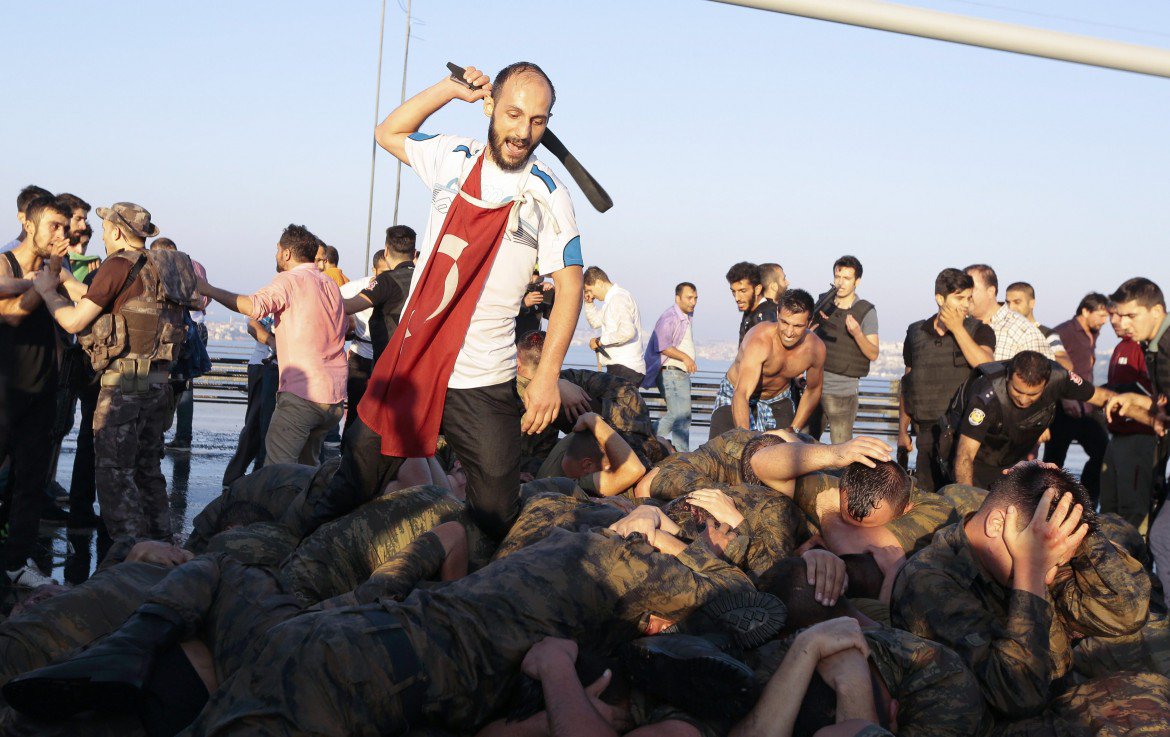
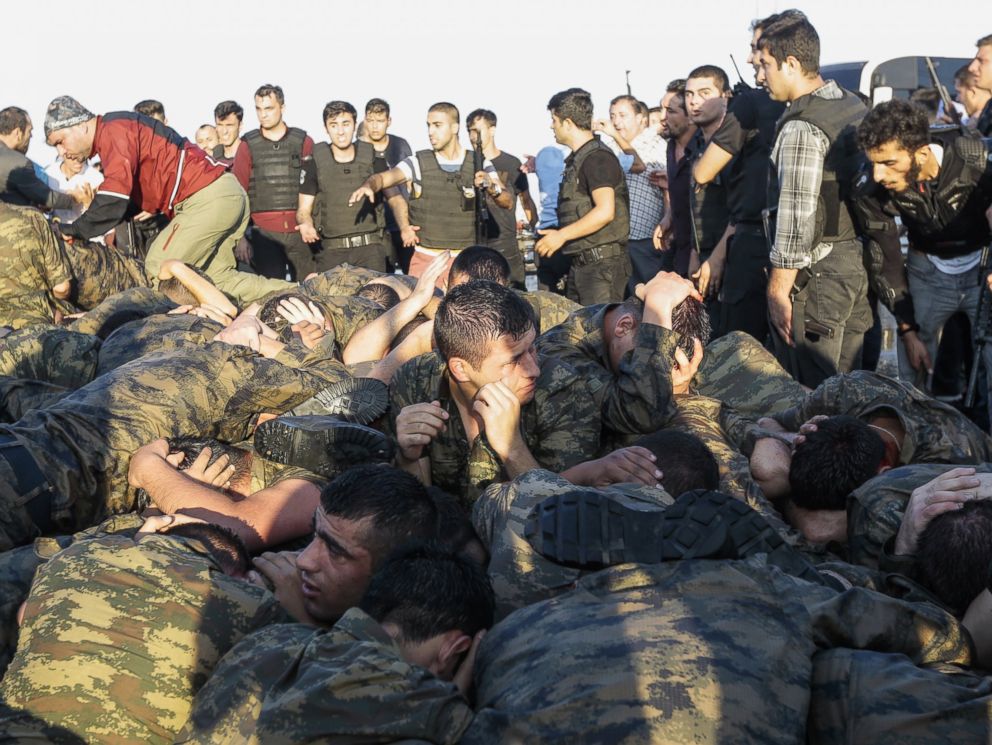
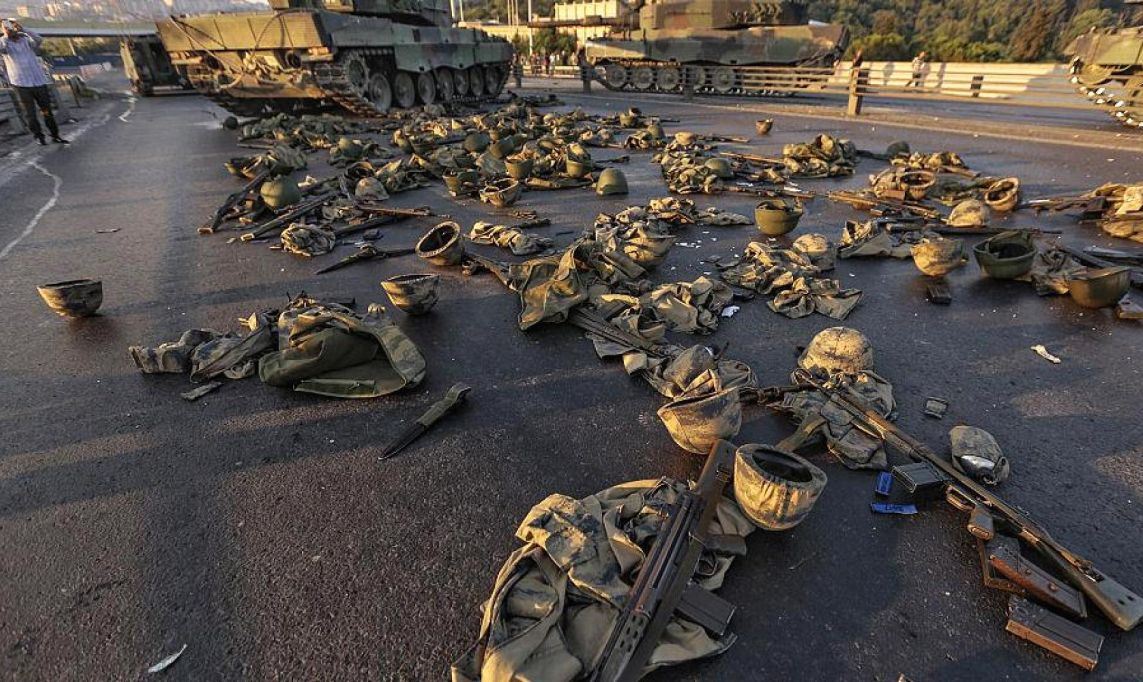 Surrendered
Turkish soldiers who were involved in the coup are surrounded by people
on Bosphorus bridge in Istanbul, Turkey, July 16, 2016.There have been
fears that many of the over 7,400 soldiers detained in the wake of the
coup were young conscripts who had no idea what was going on.
But also when there were no military coups the democracy itself had its
own challenges with respect to the quality of human rights.
Surrendered
Turkish soldiers who were involved in the coup are surrounded by people
on Bosphorus bridge in Istanbul, Turkey, July 16, 2016.There have been
fears that many of the over 7,400 soldiers detained in the wake of the
coup were young conscripts who had no idea what was going on.
But also when there were no military coups the democracy itself had its
own challenges with respect to the quality of human rights.
To understand the coup in Turkey, we have to analyze the reasons that led the plot to fail. A premise: was there really an intention to overthrow and shut down Erdogan’s government? And who are those behind the coup? Starting from these questions and exploring the possible answers, we get a reasonable and authentic framework for a story still very confusing.Let’s start from here. Assuming the existence of a manual of the ‘Perfect Coup’, it is very likely it would thoroughly explain the importance of the first goals to pull off for the success of a government overthrow.The opposition is concerned that the purge and the state of emergency decrees might turn into a witch-hunt targeting all dissident voices. The government claimed that the decrees would merely be used to root out illegal organizations inside the state bureaucracy. However, instances like the detention of human rights lawyer Orhan Kemal Cengiz (Cengiz was later released and banned from traveling) and the detention warrant issued for journalists prove that the opposition’s concerns are not unwarranted. The closure of newspapers, radio, and television stations is a signal of more pressure on civil society. Also, images of abused military officials and the Amnesty International report on the torture of detainees create legitimate concerns about respect for the rule of law during detention and interrogations. A state of emergency has been declared for three months, but its extension might lead to severe human rights violations and increased suppression of the opposition.The vast number of suspensions, detentions, and arrests have also robbed many institutions of key personnel. Particularly concerning are the purges in the key security institutions. Thousands of army officials, including more than 40 percent of generals, have been arrested, and the police and intelligence service are focused on the fight against Gulenists. These purges are likely to create a security vacuum at a time when Turkey is facing several national security challenges domestically and regionally. They will hurt the operational capability of these institutions to fight effectively against the P.K.K. and the Islamic State.The government’s efforts to restructure the military are likely to leave the military weak, divided, and politicized. The measures the government is taking are likely to break the military chain of command and create divided loyalties and competition within both the military and the security establishment.In the following months, there will be several appointments to fill emptied positions in the state bureaucracy and the security apparatus. For years, the opposition tried to draw the government’s attention to the Gulenists’ strategy of appointing other Gulenists to key positions by violating the principle of merit. Now, the government has the opportunity to reintroduce merit as the main principle of appointment. If the government chooses not to use merit, but rather loyalty, as the main determinant of appointments, it will only lead to more ineffective institutions and add to the feeling of marginalization that is already present among certain segments of the society.Before the coup attempt, Turkey had signaled that it could recalibrate its Syria policy. In return for Russia’s commitment to prevent an autonomous Kurdish region in northern Syria, Turkey might soften its approach to Bashar al-Assad’s role in a transition. The Turkish government already seemed to test the waters to gauge the reaction to rapprochement with the Assad regime. On July 13, Yildirim stated, “In order for counterterrorism efforts to succeed, there has to be stability in Syria and Iraq. We normalized our relations with Israel and Russia. I’m sure we will go back to normal relations with Syria as well.” And on August 11, the Turkish ambassador to Russia was quoted as saying, "We want the existing political leadership of the country to take part in the negotiation process.”But, it is uncertain how willing Russia will be to stop working with the Syrian Kurds whom Moscow considers a tool not just against Turkey, but also the United States.A positive outcome of the July 15 coup attempt was the unified stance from the people, and all political parties, against it. Given Turkey’s recent history of four military coups, the unified objection against the military intervention, which cost more than 200 lives, is significant. Erdogan’s decision to reach out to opposition parties was also a positive development for a country that has been extremely polarized in recent years. But the president’s refusal to include the pro-Kurdish H.D.P., which has also voiced its strong stance against the coup in the national unity effort, raises questions about his agenda in dealing with the Kurdish issue, one of the main fault lines of Turkey’s democracy. A coalition of parties that intends to write a new constitution on the basis of equal citizenship should cannot exclude the H.D.P.
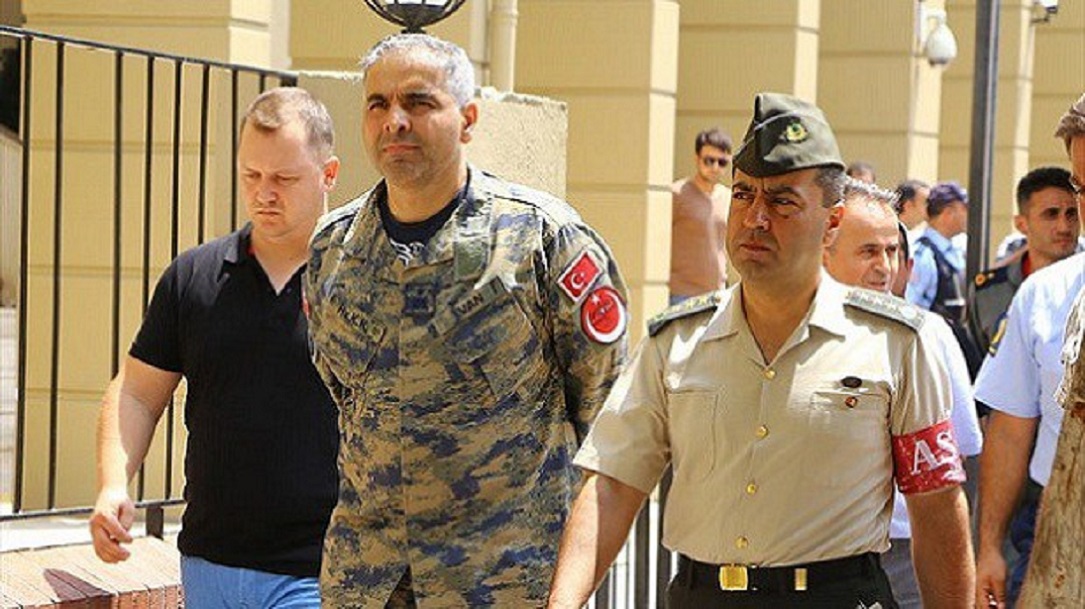

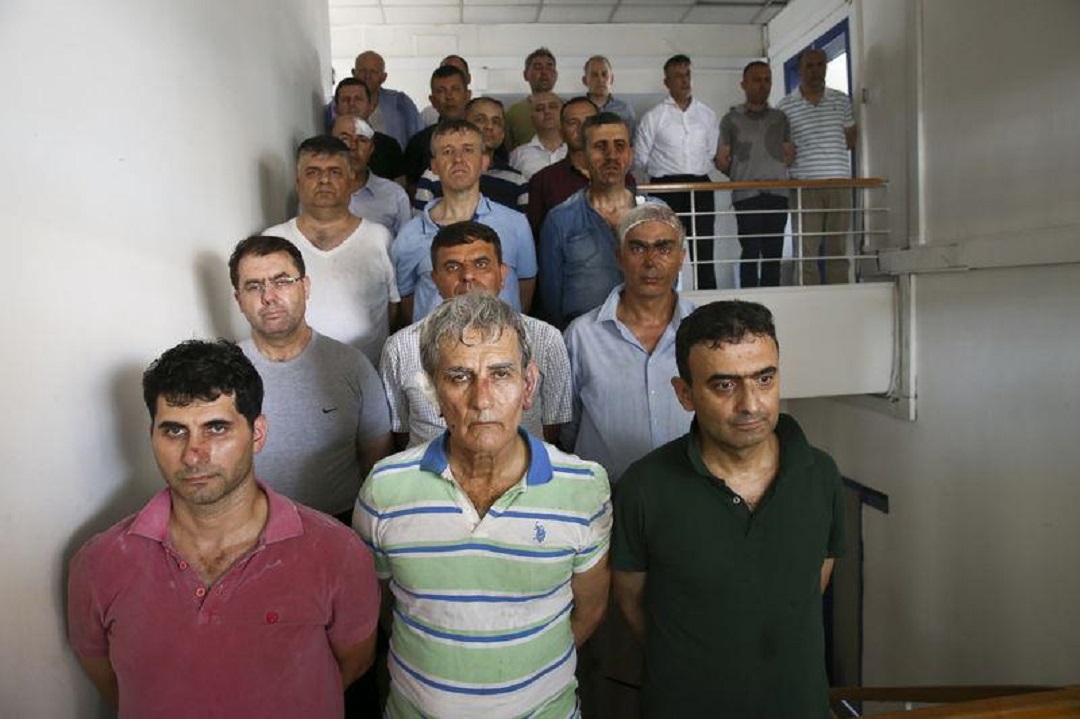
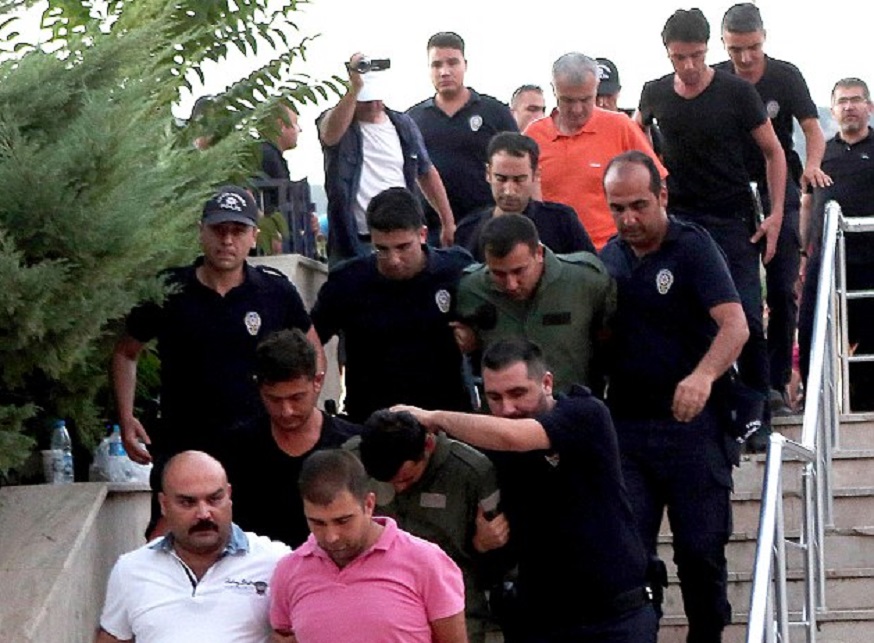
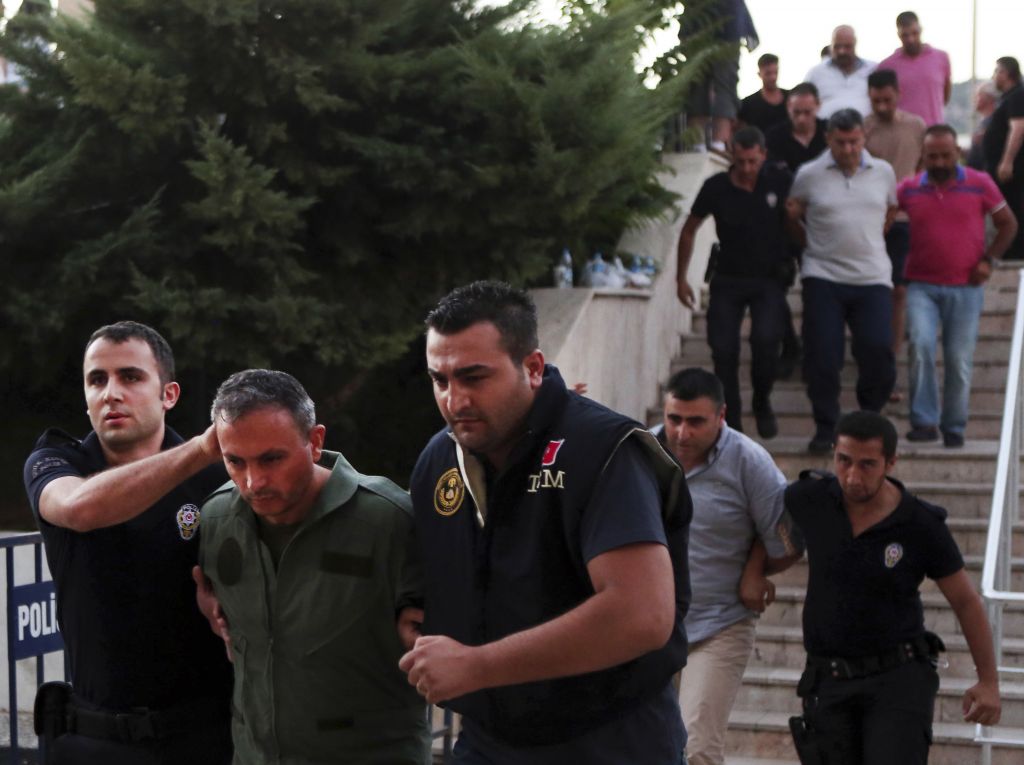 Several
other top commanders involved in the coup attempt were also
detained in operations throughout the country. Akin Ozturk was among 70
generals and admirals being detainedThe commander of the 2nd
Army Gen. Adem Huduti and its executive officer and Malatya Garrison
Commander Avni Angun and the commander of the 3rd Army Gen. Erdal Öztürk
were detained in the operations.
Several
other top commanders involved in the coup attempt were also
detained in operations throughout the country. Akin Ozturk was among 70
generals and admirals being detainedThe commander of the 2nd
Army Gen. Adem Huduti and its executive officer and Malatya Garrison
Commander Avni Angun and the commander of the 3rd Army Gen. Erdal Öztürk
were detained in the operations.
